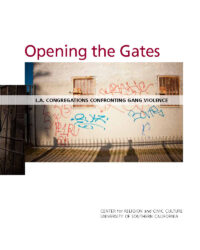Los Angeles has been regarded as the epicenter of the nation’s gang epidemic for decades. What began as relatively localized battles over turf and small-scale drug sales in L.A. has morphed into complex networks of gangs with transnational connections to regions where drugs are grown and produced among other multilayered criminal activities. While there has been a slight decline in gang-related deaths in Los Angeles in recent years, neighborhoods in relatively close proximity to the USC campus are still marred by violence.
In 2009 the Center for Religion and Civic Culture (CRCC) at USC partnered with the California Endowment to address this problem by creating the Institute for Violence Prevention (IVP). We began our efforts with the observation that neighborhoods with the highest rates of gang violence also seemed to be populated with numerous religious institutions, which led to the obvious question: What could be done to increase the effectiveness and engagement of congregations and other faith-based organizations to stem the flood of violence in their communities?
After three years of research and programming, we have drawn the following conclusions. First, faith organizations in gang-impacted neighborhoods often function as locations where residents can escape violence, rather than confront it. Second, congregations that seek to intervene in the cycles of violence in their neighborhoods often lack the organizational capacity to do so. Third, many Christian churches in these neighborhoods operate out of a theological framework that does not motivate or equip them to confront the tough social problems that they face on a daily basis. And, fourth, despite these challenges, faith communities have a latent capacity to address community needs if they are equipped with the appropriate training, mentoring, and technical assistance.
In this report we will describe the research and programming that was funded by the California Endowment and also propose some answers to the challenges that confront congregations that wish to engage the problem of violence in their neighborhoods. We do so recognizing that the critics of intervention and prevention programs have charged, perhaps justly, that few of these efforts have actually stemmed the flood of violence, given the deeply rooted social issues that characterize communities with high levels of gang activity. We see little value in cynicism, or in giving up. Rather, we are challenged by the need to help faith-based organizations as they seek to play a productive role in addressing these issues. Hence, this report is not a proposal for religion as a panacea for peace-making in the city of Los Angeles, but an attempt to increase the effectiveness of one element of the larger matrix of policies, institutions and personal efforts that make up the City of Angels.
Richard Flory is the executive director of the USC Center for Religion and Civic Culture.
Donald E. Miller is the co-founder of the USC Center for Religion and Civic Culture.
Brie Loskota is the former executive director (2016-2021) of the USC Center for Religion and Civil Culture.
